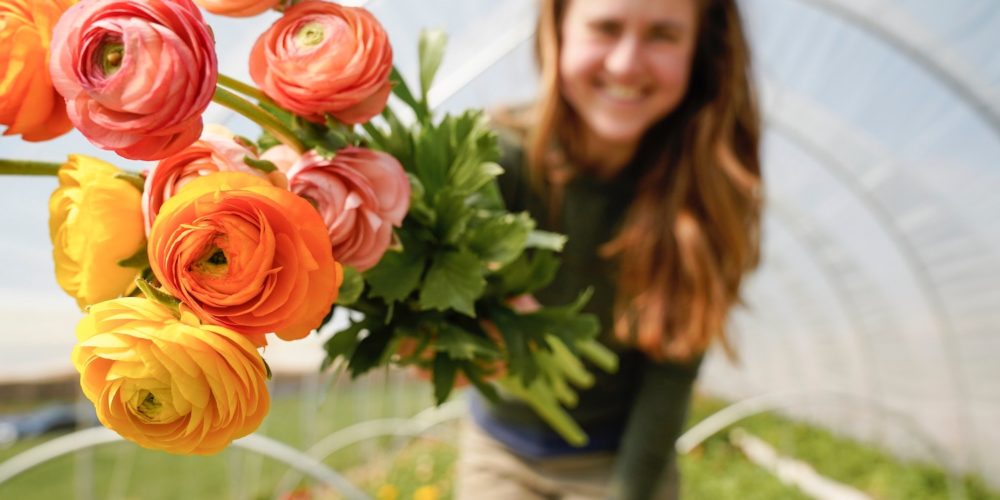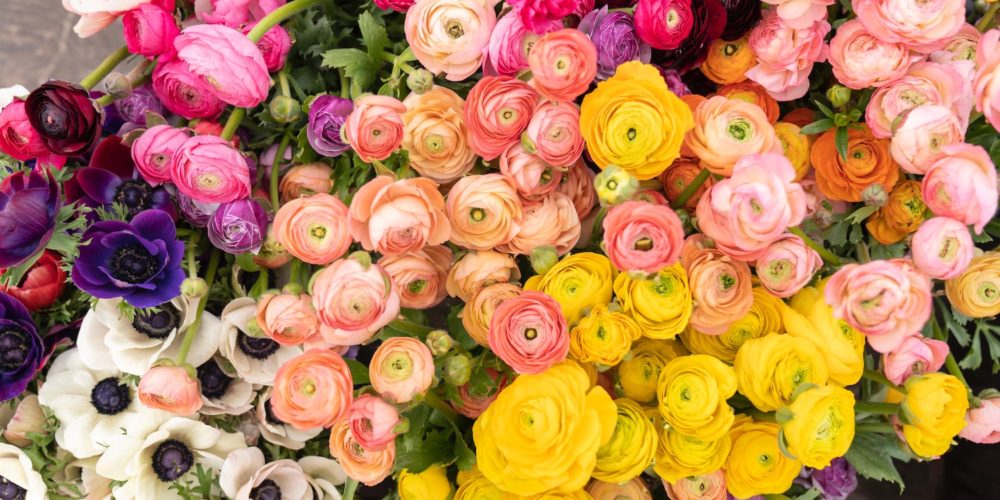British Flower Week, from 12th to 19th June, is celebration of the beauty and variety of British cut flowers, foliage and plants, as well as the florists, growers and wholesalers across the country.
Flowers from the Farm told us that UK flower farmers have experienced a surge in demand for local-grown flowers over the past year, and membership of Flowers from the Farm has increased by 25% to over 1000 artisan growers.
The majority of flowers used for weddings in the UK come from either Holland, or hot climate countries like Kenya and Ethiopia. Which is why at most times of the year you can have flowers that are not either not seasonal or able to grow in the UK. For example, red roses in February, roses would never bloom that early in the year, not even in a heated greenhouse!
But that is now changing! With the growing number of wedding couples asking for seasonal florals and foliage, and florists wanting to buy from local flower farms. The market is building year on year for British grown cut flowers, foliage and plants.

Do British grown flowers have lower carbon emissions?
Yes, absolutely!
All flowers grown commercially will have a carbon footprint. But when calculating the carbon footprint of flowers, it’s not just the growing of them that needs to be included, it must take into account the amount of heat, light, energy and water used, as well as fertiliser, and transport (by air, sea or road).
The average bouquet of flowers grown abroad and transported to UK (based on a supermarket bunch) comes in at 32.252kg of CO2… which, on average, is more than three pairs of shoes! But a British grown bunch with 15 stems of mixed outdoor grown flowers, grown and sold locally is just 1.71 Kg CO2! Now that’s a huge difference!
Carbon emissions per stem of flowers grown outside of the UK*:
- Dutch Lily: 3.478 Kg CO2
- Kenyan Gypsophila: 3.211 Kg CO2
- Dutch Roses: 2.437 Kg CO2
- Kenyan roses: 2.407 Kg CO2
Compare that with British grown*:
- British lily: 0.819 Kg CO2 (approx. 1/4 of Dutch lily)
- British snapdragon (or any outdoor, locally grown flower) 0.114 Kg CO2per stem
- British alstromeria: 0.052 Kg CO2
(Figures from Article ‘The Carbon Footprint of Flowers’ By Rebecca Swinn and Angela Coulton FFTF )
*emission calculation taken from published figures by Rebecca Swinn, using the Life Cycle Analysis (LCA), a tool for assessing environmental impacts of products and processes, from raw material acquisition to production and use stages, to compare the equivalent carbon emissions from cultivation and transportation of seven cut flowers available at UK retailers.

Why choose British grown flowers for a wedding?
It’s not just about the carbon emissions of the flowers. By buy British flowers, you know that they will have picked only days before the wedding, and in the right hands will stay hydrated and looking fresh for days to come. So once the wedding is finished, they can continued to be enjoyed.
Choice is also a big factor for many, there is a misconception that by buying British flowers means that your choices are limited. Flowers are seasonal, so it’s true that the time of year will dictate what flowers are available. But being seasonal means that the flowers are looking and smelling at their best. With so many growers across the country and networks like Flowers From the Farm, no matter what the type or colour, if it’s in season, it’ll be available.
We’re also privileged in the UK to have many beautiful, delicate and sometimes unusual flowers that wouldn’t survive being shipped around the world. Increasing popular are bright and bold cosmos, scented sweet peas and delicate garden roses.
Many UK growers also farm without the use of chemicals and encourage pollinators and provide a home for insects and wildlife.
🌼🌷🌺🌹🌻🌿
Another date for the diary… The Flower Farmers Big Weekend
Flowers from the Farm will be holding it’s annual celebration of flowers and growing, from 5th – 7th August 2022. It’s a great opportunity to visit your local flower farms, meet the wonderful growers and see the beauty, charm and sheer variety which grows in our fields across the UK.


